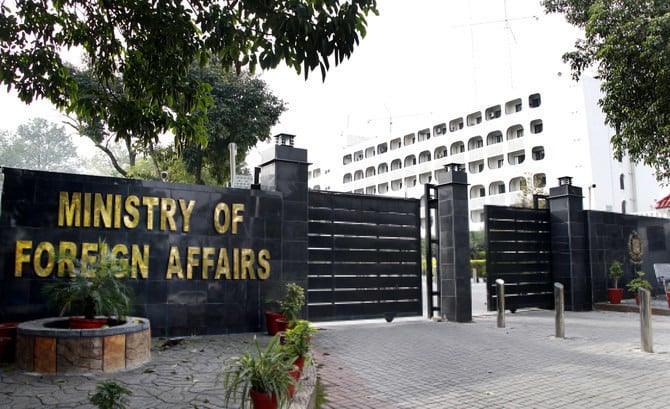Pakistan on Thursday condemned comments made by Indian Minister of Indian Defense Rajnath Singh regarding the supervision of Pakistan nuclear arsenal, calling them “irresponsible and deceitful.”
The FO statement occurred after India Defense Minister Rajnath Singh said that Pakistan’s nuclear weapons should be placed under the surveillance of the International Atomic Energy Agency (OIEA), the United Nations Nuclear Control Agency.
Responding to the statement, the spokesman of the Ministry of Foreign Affairs, Shafqat Ali Khan, dismissed the comments, describing them as reflections of the “deep insecurity and frustration” on the conventional military capacities of Pakistan, which according to him were sufficient to deter india aggression without dependence on nuclear threats.
Khan also criticized Rajnath Singh’s understanding of international nuclear supervision mechanisms, stating that his comments demonstrated “ignorance of the mandate and responsibilities” of a UN specialized agency such as the OIEA.
The FO spokesman raised concerns about the history of India in nuclear safety, citing multiple incidents of theft and illegal possession of radioactive material in recent years.
He referred to specific incidents, including a reported robbery of the Atomic Research Center of Bhabha (BARC) and Californio seizure, a highly radioactive substance, in Dehradun.
“According to the reports, five people were found with a radioactive device of the Atomic Research Center of Bhabha (BARC) in Dehradun, India.”
“These incidents suggest the existence of a black market for sensitive and double -use materials within India,” said the FO spokesman, urging the international community and Oiea to investigate the matter thoroughly.
The last climb between Pakistan and India began on April 22, when an attack in the city of Pahalgam of Iiojk Resort killed 26 people. India immediately blamed Pakistan for the incident, despite not providing public evidence.
In response, India carried out a series of hostile actions the next day of April 23, including the suspension of the 65-year-old Indus Water Treaty (IWT), canceling the visas for Pakistani citizens, closing the border crossing of Wagah-Attari, ordering the closure of Pakistan’s high commission in New Delhi, and reduction of the diplomatic staff of the crosses.
Pakistan strongly rejected the accusation, qualifying it without foundation, but took reciprocal measures through its National Security Committee (NSC). These included stopping the trade with India, closing the Pakistani airspace to the Indian aircraft and other contracts.
Tensions intensified even more in the early hours of May 7, when missile attacks hit six cities in Punjab and Azad Jammu and Kashmir (AJK), destroying a mosque and killing dozens of civilians, including women, children and elders.
In a rapid military response, Pakistan’s armed forces knocked down the Indian combat planes, including three Rafale aircraft, widely considered as a key asset of the Indian Air Force. During the next two days, India launched waves of Israeli manufacturing drones, which were also neutralized by the Pakistan army.
The confrontation intensified again in the early hours of May 10, when India attacked several Pakistani air bases with missile attacks. In retaliation, Pakistan launched the Bunyan-Un-Marshals operation, damaging Indian military facilities, including missile storage sites, air bases and other strategic objectives.
For Saturday night, the president of the United States, Donald Trump, announced that the fire had been reached after intense diplomatic efforts during the night. Minutes later, the agreement was confirmed separately by the Minister of Foreign Affairs of Pakistan, Ishaq Dar, and the Secretary of Foreign Affairs of India.




